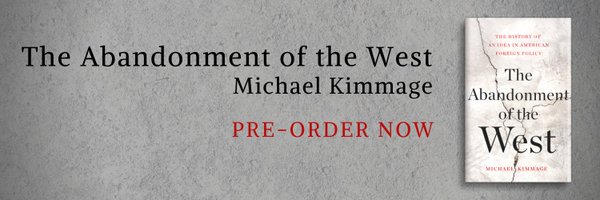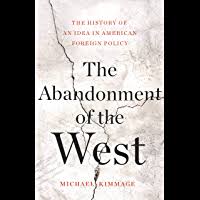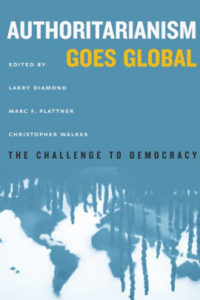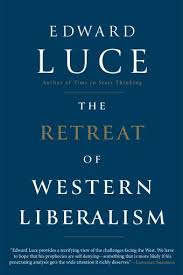
No historical rhythm guarantees that democracy is just around the corner in China or Russia or anywhere else, argues Michael Kimmage, Professor of History at The Catholic University of America. The case for the West is more urgent now than it was on the November evening the Berlin Wall disappeared. Then, a compromised Soviet communism stood condemned by history. Now, a wavering West is on trial, he contends in this exclusive extract from his new book, “The Abandonment of the West” to be published next week.
In the aftermath of the Cold War, the West’s triumphalism had encouraged overreach. The expectation that the non-West was destined to resemble the West caused enormous foreign-policy frustration after September 11. The most spectacular instance was the Iraq War. The 2003 invasion was supposed to replicate the events of 1989, oppressed citizens taking to the streets, a tyrant overthrown, his statues pulled down just as Lenin’s statues had been across Eastern Europe. George W. Bush was to be Ronald Reagan redux, a destroyer of walls. That analogy was devastatingly wrong. Less immediately wrong were the hopes that Russia and China could be ushered into the liberal international order. China would one day be a responsible stakeholder, and Russia could be either pushed or pulled into realizing the lost democratic potential of the 1990s.
 Here, 2011 and 2012 were turning points. The Arab Spring of 2011 collapsed into anarchy and violence, yet another failed repeat of the 1989 playbook. With Putin’s return to the Russian presidency in 2012, Russia’s rejection of the West was decisive. The global turn away from the West was spinning faster than the White House could accommodate. Moscow and Beijing had little genuine interest in this international order, which they judged an odd and increasingly delusional fantasy of the West. China and Russia agreed on an international order defined not by global rules and still less by liberty. Authority, great-power jockeying, spheres of influence and the balance of power were the thing…
Here, 2011 and 2012 were turning points. The Arab Spring of 2011 collapsed into anarchy and violence, yet another failed repeat of the 1989 playbook. With Putin’s return to the Russian presidency in 2012, Russia’s rejection of the West was decisive. The global turn away from the West was spinning faster than the White House could accommodate. Moscow and Beijing had little genuine interest in this international order, which they judged an odd and increasingly delusional fantasy of the West. China and Russia agreed on an international order defined not by global rules and still less by liberty. Authority, great-power jockeying, spheres of influence and the balance of power were the thing…
In the race with the West, China is the disciplined long-distance runner and Russia the risk-taking sprinter. China and Russia are no longer geopolitical adolescents in a Western world, as they had been pegged in the 1990s. Together, China and Russia constitute a distinct and gathering challenge. They will continue to manipulate a pliable information landscape. They will tarnish the West and the Western model by amplifying actual shortcomings, by inventing nonexistent shortcomings, by presenting American foreign policy as the sum total of its failures, by portraying social divisions as more extreme than they are and by taking advantage of whatever crisis or opportunity comes their way – protests, referenda, contested elections.
 China and Russia bring formidable resources to bear on these tactics, integrating intelligent services, the military, state-sponsored media and diplomacy. (This is a mix that the big players of the Cold War, including the United States, had employed from 1945 to 1991, with the exception of state-sponsored media for the United States.) Strange perhaps by the standards of the West-dominated 1990s, these developments are by no means fatal to the West. They are the regular pattern of great-power rivalry – not “the rare occurrence of the expected,” in William Carlos Williams’s gorgeous phrase. China’s and Russia’s rise as non-Western powers was the predictable occurrence of the (un)expected. The West is not equivalent to international order, and the West will have to recognize this, learning to live in tension with others powers and for the first time in centuries to contend with non-Western schemes of international order and information flows. International news services that do not originate in the West, a novelty when Al Jazeera was created in 1996, will remain a fact of life.
China and Russia bring formidable resources to bear on these tactics, integrating intelligent services, the military, state-sponsored media and diplomacy. (This is a mix that the big players of the Cold War, including the United States, had employed from 1945 to 1991, with the exception of state-sponsored media for the United States.) Strange perhaps by the standards of the West-dominated 1990s, these developments are by no means fatal to the West. They are the regular pattern of great-power rivalry – not “the rare occurrence of the expected,” in William Carlos Williams’s gorgeous phrase. China’s and Russia’s rise as non-Western powers was the predictable occurrence of the (un)expected. The West is not equivalent to international order, and the West will have to recognize this, learning to live in tension with others powers and for the first time in centuries to contend with non-Western schemes of international order and information flows. International news services that do not originate in the West, a novelty when Al Jazeera was created in 1996, will remain a fact of life.
A subtler challenge is the lingering reality of Chinese and Russian authoritarianism. A premise of the 1990s was that liberty is smooth. It is the way to progress. It is progress, and it can subdue or even eliminate history, whereas authoritarianism or tyranny is rough and a recipe for political misfortune. A misreading of the Soviet Union’s collapse, this was a misreading of politics per se. Authoritarian forms of government tend to stagnate, and they can be undone by leadership transitions and angry crowds, but empires, monarchies and dictatorships are more common historically and often more long-lasting than republics or democracies. Authoritarianism works.
 China and Russia are struggling to demonstrate the validity of authoritarianism – its coherence and efficiency, its integration of government functions, its promise of stability – in what could be an existential challenge to the West. No underlying historical rhythm guarantees that democracy is just around the corner in China or Russia or anywhere else. Beijing and Moscow have shown some ability to incite authoritarianism not just against the West but within the West. By contrast, liberty and self-government are fragile, as de Tocqueville and the Founders were well aware. Liberty and self-government demand vigilance, and self-government in particular demands an educated citizenry, which is hard to achieve and harder still to maintain. The Sino-Russian authoritarian challenge does not make liberty less relevant to international affairs or to American foreign policy. To the contrary, it makes it more relevant. The West as a self-contained or expanding venture in liberty and self-government is more relevant as well. The case for the West is more urgent now than it was on the November evening the Berlin Wall disappeared. Then, a compromised Soviet communism on trial. Now, it is a wavering West that is on trial.
China and Russia are struggling to demonstrate the validity of authoritarianism – its coherence and efficiency, its integration of government functions, its promise of stability – in what could be an existential challenge to the West. No underlying historical rhythm guarantees that democracy is just around the corner in China or Russia or anywhere else. Beijing and Moscow have shown some ability to incite authoritarianism not just against the West but within the West. By contrast, liberty and self-government are fragile, as de Tocqueville and the Founders were well aware. Liberty and self-government demand vigilance, and self-government in particular demands an educated citizenry, which is hard to achieve and harder still to maintain. The Sino-Russian authoritarian challenge does not make liberty less relevant to international affairs or to American foreign policy. To the contrary, it makes it more relevant. The West as a self-contained or expanding venture in liberty and self-government is more relevant as well. The case for the West is more urgent now than it was on the November evening the Berlin Wall disappeared. Then, a compromised Soviet communism on trial. Now, it is a wavering West that is on trial.
 A transatlantic West grounded in liberty and self-government has ebbed and flowed in American politics and in American foreign policy. Woodrow Wilson’s presidency ended in the decline of the West or a vacuum of the West, which was followed by protracted crises of the West in the 1920s and 1930s, very much crises of liberty and self-government. Lyndon Johnson mangled Kennedy’s picture-perfect West by deciding to escalate in Vietnam, pledging the United States to the protection of a nonexistent democracy in South Vietnam and tying American foreign policy in knots. Sickened by the poison of the Vietnam War, Richard Nixon did not restore faith in the West between 1968 and 1974. In the Watergate scandal, Nixon’s disdain for the art of self-government coupled with the stirrings of an American authoritarianism stained American leadership of the West. Thirty years later, the Iraq War divided the West, leaving an impasse in the transatlantic relationship. The Europeans, as the German foreign minister proclaimed at the 2003 Munich Security Conference, were not convinced. They were not convinced by the American rush to war.
A transatlantic West grounded in liberty and self-government has ebbed and flowed in American politics and in American foreign policy. Woodrow Wilson’s presidency ended in the decline of the West or a vacuum of the West, which was followed by protracted crises of the West in the 1920s and 1930s, very much crises of liberty and self-government. Lyndon Johnson mangled Kennedy’s picture-perfect West by deciding to escalate in Vietnam, pledging the United States to the protection of a nonexistent democracy in South Vietnam and tying American foreign policy in knots. Sickened by the poison of the Vietnam War, Richard Nixon did not restore faith in the West between 1968 and 1974. In the Watergate scandal, Nixon’s disdain for the art of self-government coupled with the stirrings of an American authoritarianism stained American leadership of the West. Thirty years later, the Iraq War divided the West, leaving an impasse in the transatlantic relationship. The Europeans, as the German foreign minister proclaimed at the 2003 Munich Security Conference, were not convinced. They were not convinced by the American rush to war.
Yet after each of these downturns and each of these setbacks, the transatlantic relationship and a foreign policy oriented toward liberty and self-government could be salvaged. The West may yet be consigned to some museum of American foreign policy, a thought-provoking instance of how things were back in the twentieth century, a punctuation mark ending the chapter that began with the Declaration of Independence. Or it can be revived.
“The Abandonment of the West” will be published on April 21. Order here.







